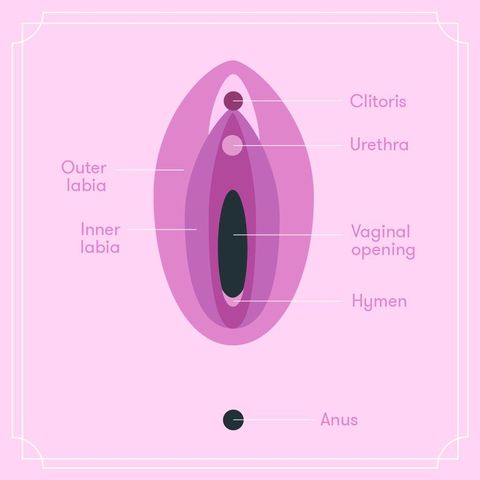EID Mubarak! Let’s talk about the hymen and virginity testing: IS this the membrane of honor?
Eid Mubarak to all my friends, families, and followers who may be celebrating the end of the holy month of Ramadan. I have been a little MIA during this month so that I can spend more time with my family and have been working hard, and well, I’m exhausted from a month of fasting!
“What a strange topic you have chosen to discuss”, some of you may be thinking. Well, strange to some people but this is something I see in my office and have dealt with to some degree my entire life.
See, as a Muslim woman who grew up in the south and the only daughter (I have three brothers) of immigrants from Pakistan, the concept of chastity has been something I have dealt with my entire life. In the south, sex education used to be about abstinence (maybe it still is?). My parents never spoke to me about any of this because of shame (I will one day discuss the difficulty around my first menses!). And I found the love of my life and got married after the age of 30 (due to my career and personal choices) and even though I am a gynecologist, I did not have my first gyno exam until after I got married.
So, this is years and years of dealing with these concepts in the dark. So, let’s talk about it!
Prior to the pandemic, I fondly remember hosting an annual iftar (break fast) in my office for the community and my patients. I enjoyed meeting patients and their friends/families outside of the setting of office visits.
One question that always came up with every Q&A at the end of the iftar was related to the hymen and what actions may incidentally break it! It was no surprise to me given my upbringing. Additionally, many of my patients tell me time and time again they are uncomfortable discussing this with their White male or female doctors (the judgment in the west around Muslim woman and sexual oppression is palpable by every brown girl out there). They are also uncomfortable discussing these issues with really conservative myopic Muslim doctors as well.
So, are we still focused on the hymen and its relationship to lack of coitarche (1st sexual experience or sexual debut) or as we have historically known it, the cultural construct of virginity? Yes. And the idea of virginity testing comes up. Every. Single. Time.
In fact, I would say about 5-10 times a year, I have a patient book an appointment from a different country or locally to get assessed for virginity. Let me be clear. This is not a real test or medical condition that can be tested for and has no scientific merit or clinical indication. In fact, the World Health Organization and other agencies have condemned this practice as a human rights violation and can be associated with long term health consequences or psychological issues.
It is a harmful practice with social, cultural, and political roots. Around the world, it is referred to as a “two-finger” test or vaginal exam. Basically, the patient wants to know if their hymen is intact or if we, as doctors, can reveal if she has had penetrative intercourse. Sometimes it is parents or in laws that want this examination done. It is usually brought up for unmarried girls/women under some force or coercion to assess their virtue or honor.
Regardless of the reasoning, when the topic has been brought up in my office, it is usually the patient questioning herself. What do I do about it? Do I ridicule or shame them out of my office for even asking? NEVER.
However, many patients have told me that other doctors in the West have done this to them. I absolutely use this as an educational opportunity to review female anatomy, the purposes of various anatomic structures, their menstruation and sexual function and discuss the lack of clinical significance of the hymen and the cultural and social construct of virginity. Many gynecologists do not look at or even assess for the hymen (like the clitoris, it is often ignored). Because I deal with vestibulodynia and talk about the vulvar vestibule all day, the hymen is something that I also review and assess to ensure there is no significant pathology causing obstruction.
So, what is the hymen? Does it have a medical purpose? Why is there so much interest in this???
Well first of all, the hymen is a thin fold of mucous membrane that exists in front of the vaginal opening. It is essentially a remnant of tissue that is leftover from embryological development. To date, there has been no medical or physiologic purpose discovered about the hymen.

The hymen can vary for a variety of women, some with barely any tissue or covering only parts of the vagina and others with thick tissue surrounding the vaginal in the shape of a clock. For most women it is stretchy and flexible so may not tear but can become stretched out. Therefore, for some women, it stretches out or tears with exercise, bike riding, day to day activity, tampon use and of course sexual intercourse. For some, there may be bleeding and others never experience bleeding or pain when they have sex.
The hymen can be a source of some medical issues for an individual who identifies as female if there is a birth anomaly.
For instance, rarely, the hymen may have a different shape or have no perforation or partial perforation, which makes menstruation difficult or penetration difficult. Sometimes this manifests with cyclical pain but no menses. Some people menstruate but cannot use tampons because there is only a minimal perforation. It can also result in vaginismus, pelvic pain, or other symptoms. Usually, though rare, this is when the hymen has to be surgically removed.
The possibility of early hymen tearing or breakage prevents many women from seeking the gynecologic care they need. They may miss a pap/HPV test, irregular bleeding assessment, or pelvic pain or evaluation for painful menses.
That being said, the hymen is most known for its alleged correlation with virginity. I like to say that there has not been a vaginal sexual debut (many people have other forms of sex but not penetrative intercourse) or coitarche. Virginity is a social and cultural construct with roots in patriarchy and misogyny that links a women’s chastity with her penetrative status.
In many cultures, virginity is linked to the honor of the family and community.
There are many areas of the world where claims of not being a virgin may ostracize a family and subsequently the woman involved. Sometimes it leads to the woman becoming a victim or violence or worse, death. These are the honor killings you may read about usually perpetrated by a male family member who believes the sister, future wife, daughter is not chaste and therefore perform these unthinkable acts.
It is these women that sometimes seek out cosmetic surgery to reconstruct this membrane. Hymenoplasty is the type of surgery that is performed to suture together or place a graft or stitch around the opening of the vagina so that at penetration, bleeding will occur. This is a surgery I have been asked to perform a handful of times as well. Other women may seek this surgery as well for other reasons.
So what do you do if you are asked to perform a virginity test as a clinician or are seeking one as a patient?
As a doctor, I try to always listen to the concerns of my patient and validate them. I do not practice paternalistic medicine. My patients are actively involved in the treatment plan. I always educated my patients without judgment and patients should use it as a chance to learn more about their body.
Let me be clear, there is no mechanism that exists to assess a woman’s vaginal sexual debut or coitarche (virginity). For instance, “popping the cherry”, penetrating through tissue or blood stained sheets should not be expected. Virginity testing is not something that should be performed or endorsed. Demeaning a woman to have a virginity test is a human rights violation and actually cannot be proven. It is up to those individuals to disclose if they feel comfortable disclosing whether or not they have had sex.
